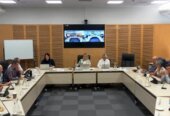
Image via Wikipedia
By Peter Carr
From time to time most people reflect on what is around them and how their surroundings affect their daily lives. Surroundings may include one’s home, village, weather, personal relationships and often matters upon which one has no control.
A not often recognised pressure point is language. Or rather the degree to which one’s common language is usurped to a factor that it becomes annoying. Not of and in itself but when it causes you to pause and have to think – ‘just what did he say?’
Clearly a foreigner’s attempt to speak in one’s own language is not only to be commended but needs care and respect as to how the uttered words are translated internally in one’s mind. But when the speaker is a local – as in being a national of the country in which one resides – then the difficulty often turns into aggravation.
I guess that some of this harks back to the horrifyingly percentage of young – and not so young – people who cannot read effectively. I recall helping a far-seeing Cambridge lady to launch a particularly good initiative, driven initially by one of her children who was experiencing reading difficulties. It caused her to believe the New Zealand reading curriculum was not concentrating enough on the sound of words. Or phonics to give it a correct name.
At that time – and remember this was a dozen years or more ago – there was an estimated 110 pupils at Cambridge High School with difficulty in the learning experience about reading. The local designer of the new phonics opportunity attempted to help the school to use her method but, sadly, they did not have sufficient budget capacity to engage a teacher (even part time) to promote the ideal. So several of us got behind the initiative and raised (by various means and in swift order) $10,000 to support the school.
At that time, it was also apparent that the nearest prison had an enormous percentage of incarcerated people with reading difficulties and an attempt was made to assist the staff there by offering the clearly successful phonics system.
However, the great government bureaucratic clobbering machine came into being and the initiative was doomed when we were told to ‘discuss it with Wellington’.
Sadly, dialect too starts to make the purity of reading and speech somewhat difficult. The Kiwi way of turning statements into the interrogative by raising the voice cadence at the end of a sentence forms part of that. Teachers are frustrated when their students insist on using the word ‘youse?’ And how can they drive such idiolect out of the minds of the utterers?
Which leads to the construction of sentences. Having attended what would now be regarded as an ‘old school I was driven to the point of very sore fingers when the English master’s ruler would descend swiftly for the mortal sin of finishing a sentence with a preposition. Listen to some of our news readers – and especially talk-back hosts – who, according to my alma mater’s rules, should be taken off the air. As that superb orator Winston Churchill so eloquently put it – ‘this is the type of arrant pedantry up with which I will not put’. So just how sinful is it to change the structure of speech / writing to reflect an easier approach to being understood? I imagine the retired teachers in my village will be hounding me this week.









